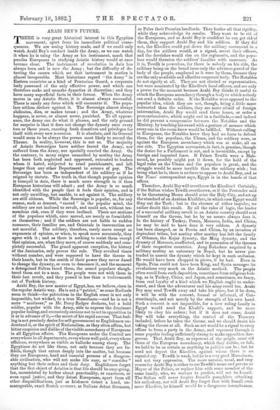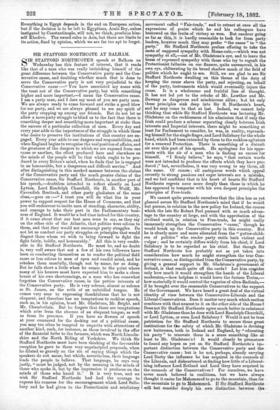ARABI BEY'S FUTURE.
TELLHE is very great historical interest in this Egyptian movement, apart from its immediate political conse- quences. We are seeing history made, and if we could only watch Arabi Bey's conduct inside the Army, as we can watch it when he is using the Army as his instrument, much that puzzles Europeans in studying Asiatic history would at once become clear. The instrument of revolution in Asia has always been and is now the Army ; but the difficulty of de- tecting the causes which set that instrument in motion is almost insuperable. Most historians regard "the Army" in Eastern countries as a kind of Przet4ariau Guard, a corporate body possessed of the only effective power, and which can therefore make and unmake dynasties at discretion ; and they have many superficial facts in their favour. When the Army moves in any Asiatic State, it is almost always successful. There is rarely any force which will encounter it. The popu- lace seldom declare against it. The Sovereign almost always abdicates, dies, or makes terms ; and the Army, whatever happens, is never, or almost never, punished. To all appear- ance, the Army can do what it pleases, and the only ground for surprise is that it does not change the dynasty once every two or three years, exacting fresh donatives and privileges for itself with every new accession. It is absolute, and its General would seem to be always the person most likely to ascend the Throne. In reality, however, this is not so. The majority of Asiatic Sovereigns have neither feared the Army, nor suffered from the Army, nor specially courted the Army. On the contrary, in many reigns unmarked by mutiny the Army has been both neglected and oppressed, entrusted to leaders whom it hated, subjected to cruel punishments, and left longer than any other Department in arrears of pay. The Sovereign has been as independent of his soldiery as if he reigned by statute. The truth is, that though popular opinion is tranquil in Asia, there is much more strength in it than European historians will admit ; and the Army is so much identified with the people that it feels their opinions and is not only unwilling, but unable, to act against it. The soldiery are still citizens. While the Sovereign is popular, or, for any reason, such as descent, "sacred " in the popular mind, the soldiery are not inclined to revolt, and could not, without tre- mendous risk, even if they were inclined. There are sections of the populace which, once moved, are nearly as formidable as themselves ; and if the soldiers are not liable to sudden massacre, their families are, and Orientals in insurrection are not merciful. The soldiery, therefore, rarely move except as exponents of opinion, or when, to speak more accurately, they agree with it ; and as there is nothing to resist them except that opinion, are, when they move, of course suddenly and com- pletely successfuL The grand apparent exception, the history of the Janizaries, only proves the rule. They revolted times without number, and were supposed to have the throne in their hands, but in the zenith of their power they never dared to change the dynasty, or even to denounce it, and the moment a deterinined Sultan faced them, the armed populace slaugh- tered them out to a man. The people were not with them in their last revolt, and they passed in less than a tvelvemonth out of Turkish history.
Arabi Bey, the new master of Egypt, has, we believe, risen in the regular Asiatic way. He is not a" patriot," as some Radicals seem to think—for patriotism in the English sense is not only impossible, but wicked, to a true Mussulman—and he is not a mere "mutineer," as Mr. Percy Badger declares, but a bold soldier, popular with the Army, able to express the dominant popular feeling, and excessively anxious not to act in opposition to it or in advance of it,—the secret of his rapid success. That feel- ing is not precisely desire for self-government as Englishmen un- derstand it, or the spirit of Nationalism, as they often affirm, but bitter suspicion and dislike of the visible ascendancy of Europeans in all Egyptian affairs. The Europeans under the Control are everywhere in all departments, everywhere well paid, everywhere officious, everywhere as visible as bullocks among sheep. The Egyptians do not like them, not only because they are In- fidels, though that enters deeply into the matter, but because they are Europeans, hard and unsocial persons of a disagree- able civilisation, who will not make life easy, or " consider " anything but their orders and their duty. Englishmen forget that the first object of Asiatics is that life should be easy-going, lax, unrestricted by bother about punctuality, or exactness, or even equal justice, and they detest Europeans, apart from all other disqualifications, just as Irishmen detest a hard, un- manageable, exact Scotch overseer, as Italians detest Germans, or Poles their Prussian landlords. They loathe all that rigidity, while they acknowledge its results. They want to be rid of the Europeans, and as Arabi Bey is confident be can get rid of them, they support Arabi Bey and his soldiers. If they did not, the Khedive could put down the military movement in a day, for the soldiers would, at a signal, arrest their officers, and the dervishes would rise on the regiments, and the popu- lace would threaten the soldiers' families with massacre. As it is, Tewfik is powerless, for there is nobody on his side, the military being on the broad issue only the advance-guard of the body of the people, employed as it were by them, because they are the only available and effective corporate body. The Notables do not signify at all. They are not elected or representative, but were nominated by the Khedive's local officers, and are only a power for the moment because Arabi Bey thinks it useful to attack the European ascendancy through a body to which nobody can send a definite order. If the Notables were opposed to the popular idea, which they are not, though, being a little more instructed than the soldiers, they are more afraid of foreign intervention, Arabi Bey would send them home, or order a pronunciamiento, which might end in a fusillade,—and indeed he did prevent a compromise between the Notables and the Ministry, by touching his sword with a gesture of menace which every one in the room knew would be fulfilled. Without calling in Europeans, the Notables knew they had no force to defend them, for the populace, the Ulema, and the soldiery were, as against the European ascendancy which was at stake, all on one side. The Egyptian movement, in fact, is genuine, though the desire for a Parliament is not, and is irresistible, except by foreign and imported force. If Prince Tewfik were a Mah- mond, he possibly might put it down, for the hold of the legal ruler on the Ulema and the populace is great, and the struggle would be more terrible than the soldiery wish ; but being what he is, there is no force to oppose to Arabi Bey, and as the Times' correspondent says, Egypt is in the hands of that officer.
Therefore, Arabi Bey will overthrow the Khedive? Certainly, if the Sultan wishes Tewfik overthrown, or if the Pretender said to be threatening Mecca should seize the Holy City, and set up the standard of an -Arabian Kbalifate, in which case Egypt would fling out the Turk ; but in the absence of either impulse, we rather doubt this result. By all the rules of logic, the leader of a successful military revolt in an Asiatic country should seat himself on the throne, but he by no means always does it. In the history of Turkey, Persia, Morocco, India, and China, he may be said to have done it very seldom. A dynasty has been changed, as in Persia and China, by an invasion of dependent tribes, but mutiny after mutiny has left the family of Othman, the Kajar dynasty, the Ming dynasty, and the dynasty of Morocco, unaffected, and in possession of the thrones of their respective countries. Jung Buhadoor acquired by a military mutiny an autocracy in Nepal, but he never pre- tended to unseat the dynasty which he kept in such seclusion. He would have been chopped in pieces, if he had. Even in Spain, Prim could not have been King, and Spain manages its revolutions very much on the Asiatic method. The people often recoil from such deposition, sometimes from religious feel- ing, as in Turkey, China, and Japan, and sometimes, we fancy, from real loyalty of a kind which we English ought to under- stand, and then the adventurer and his army recoil too. Arabi Bey may send Tewfik away and take his place, but if he does, it will be with the consent, formal or informal, of Con- stantinople, and not merely by the strength of his own hand. Such a consent is not impossible, for a new ruling family in Egypt would need the Khalif's support, and be more likely to obey his orders ; but if it does not come, Arabi Bey will take everything, the control of the Treasury included, before he takes the throne, and we should doubt his
taking the throne at all. Such an act would be a signal to every officer to form a party in the Army, and represent through it some popular feeling sufficiently strong to make opposition dan- gerous. That Arabi Bey, as exponent of the people, must rid them of the European ascendancy, which they dislike, or fall, we hold to be as certain as anything in politics can be ; but he need not deport the Khedive, against whom there is no especial cry. Tewfik is weak, but he is a very good Mussuluaan, and not very oppressive. The more natural, usual, and easy course for Arabi Bey is either to use Tewfik 's name and govern as Mayor of the Palace, or replace him with some member of the same family, who, we venture to predict, will not be Ismail. The Sultan will never forgive Ismail's pamphlets attacking his orthodoxy, nor will Arabi Bey forget that with Ismail once more Khedive, he himself would be a dangerous incumbrance. Everything in Egypt depends in the end on European action, but if the decision is to be left to Egyptians, Arabi Bey, unless instigated by Constantinople, will not, we think, proclaim him- self Khedive. The sword rules in Asia, but there are liinits to its action, fixed by opinion, which we are far too apt to forget.



































 Previous page
Previous page